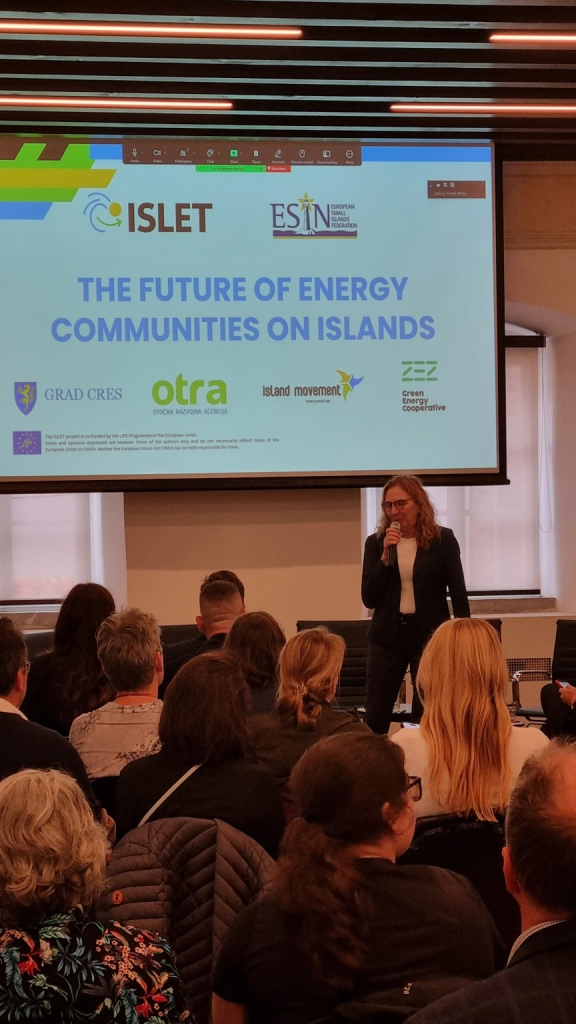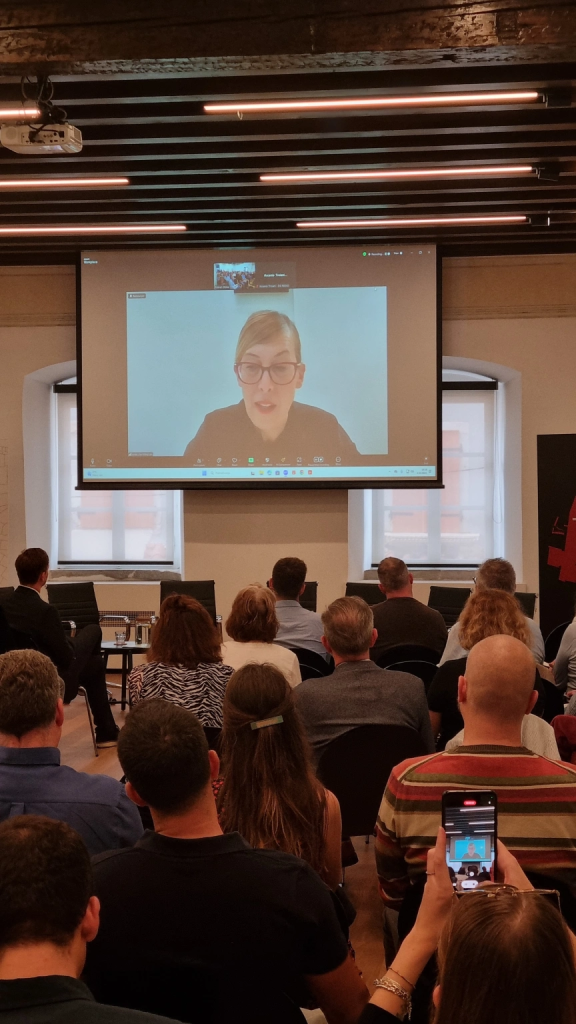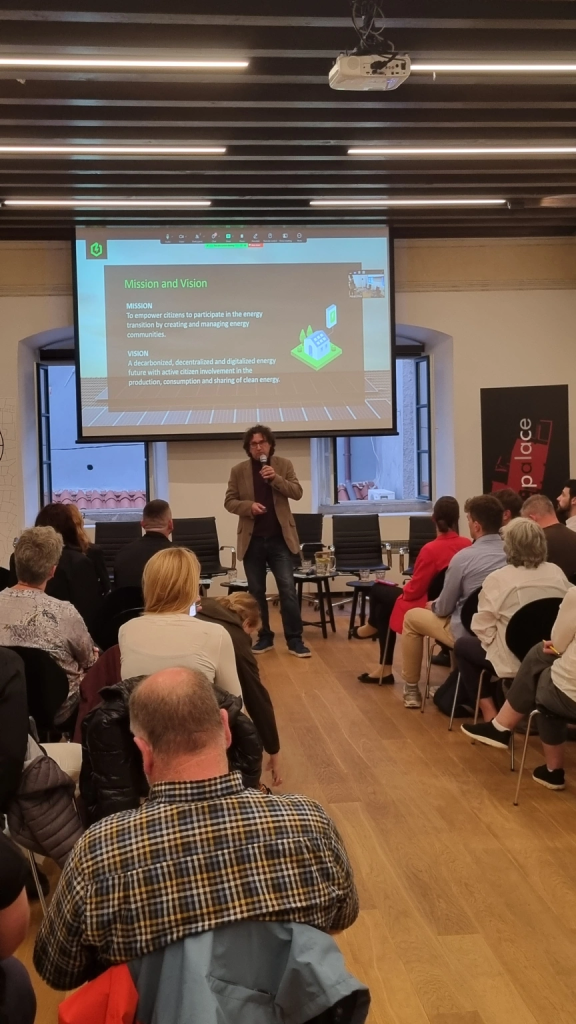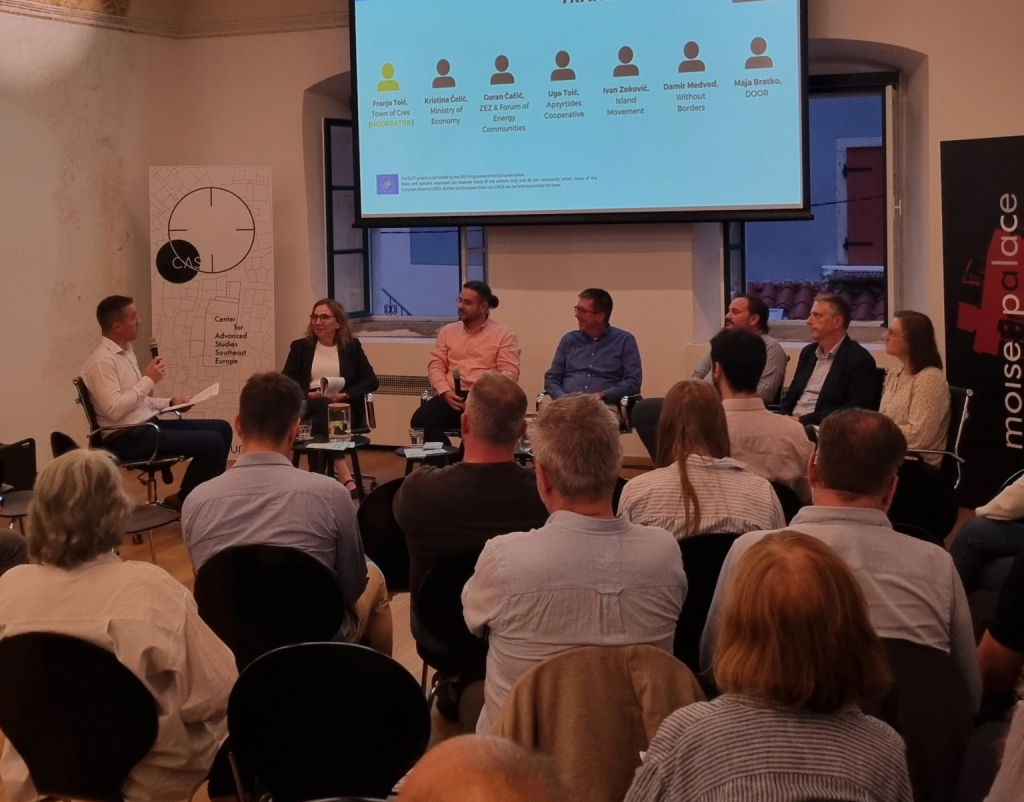As part of a three-day event that brings together participants of the ISLET and ESIN projects, a conference was held on the topic of the future of energy communities on the islands
As part of a three-day event that brings together participants of the LIFE ISLET project and members of the European Federation of Small Islands (ESIN), on October 2, 2024, a conference called “The Future of Energy Communities on Islands” was held in the beautiful setting of Moise Palace on the island of Cres. The conference brought together experts, representatives of local communities, state institutions and international organizations, and the key role of island communities in the energy transition was discussed.

The conference was opened by the mayor of Cres, Marin Gregorović, who highlighted energy transition projects related to the City of Cres. Introductory speeches were also given by Ivan Matić, member of the board of directors of the Island Movement, and Kristina Čelić, director of the energy sector in the Ministry of Economy. All speakers emphasized the key role of local communities in the implementation of European energy policies, with a special focus on islands.

After the welcoming speeches, Aida Liha Matejiček, a representative of the European Commission, addressed the audience through an online presentation, who referred to European energy policies and projects aimed at islands.

Local communities as drivers of energy transition
The first round table, entitled “Local communities as drivers of the EU’s energy transition”, gathered prominent participants, including the mayor of Cres, Marin Gregorović, Elise Van Dijk from the CE4EU Islands Secretariat, Cathy Ní Ghóill from the European Association of Small Islands (ESIN), Alexis Chatzimpiros and Michael Kristensen from Sams, Denmark, and Petros Markopoulos from DAFNA, Greece. The discussion was moderated by Maja Jurišić, president of the Island Movement.
Panelisti su podijelili svoja iskustva o razvoju energetskih zajednica na otocima, naglašavajući izazove i prilike koje energetska tranzicija donosi, ne samo u smislu održivosti, već i za lokalni razvoj. Tijekom rasprave, posebno je istaknuta važnost umrežavanja i dijeljenja iskustava iz prakse među otočanima i sudionicima iz drugih država.
Ova međusobna suradnja omogućava razmjenu najboljih praksi, jačanje zajedničkih resursa i razvoj inovativnih rješenja prilagođenih specifičnim potrebama otočnih zajednica. Gradonačelnik Gregorović naglasio je ključnu ulogu uključivanja lokalnih zajednica u energetske projekte, ističući da je zajednički rad na ovim inicijativama presudan za postizanje održivih i učinkovitih energetskih rješenja.

Davor Sokolović from MEC, the first energy community, held a presentation in which he shared the story of the establishment and development of a community that brought together citizens and local institutions with the goal of creating a sustainable and energy-independent society.

Energy communities in Croatia: A dream or reality?
The second round table, entitled “Energy communities in Croatia: dream or reality?”, brought together key participants, including Kristina Čelić from the Ministry of Economy, Goran Čačić from ZEZ and the Forum of Energy Communities, Ugo Toić from the cooperative Apsyrtides, Ivan Zoković from Movement of the Islands, Damir Medved from the association Bez granica and Maja Bratko from the Society for Designing Sustainable Development (DOOR). Franjo Toić from the City of Cres moderated the round table.

At this panel, the participants of the Forum of Energy Communities presented their first energy communities that recently received operating permits. The key presentation was given by the director of the energy sector from the Ministry of Economy, who pointed out that she had received from the Forum obstacles and recommendations for improving the legislative framework and unlocking the potential for the development of energy communities.
At the moment, we have three established energy communities, and not one shared kWh of electricity
The importance of the presentation by the coordinator of the Forum of Energy Communities, Goran Čačić, was also highlighted. He emphasized that the Forum brings together experts ready to help the Ministry, emphasizing concrete experience and knowledge that will help make energy communities a reality.
At the moment, we have established three energy communities, but we have not produced or distributed any kWh of electricity, nor do we know when we will be able to do so. Čačić warned that the costs of establishing and managing energy communities are too high, which makes their sustainability impossible. There is an urgent need to change the law, remove regulatory barriers and create a fund that will encourage the establishment and development of communities.
However, as the participants pointed out, it is necessary to successfully remove the barriers that slow down the establishment of strong energy communities. Consequently, projects like ISLET and ESIN open up the economic and social progress of entire island communities.
Finally, Kristina Čelić pointed out that she will actively involve the members of the Forum in working groups for amending the law. It is aware of the obstacles they face, and the Ministry is ready to eliminate them in cooperation with the experts of the Forum. He believes that working together in the coming period will encourage the development of communities.
This round table emphasized the need for synergy between local communities, state institutions and civil society in order to ensure the successful development of energy communities in Croatia.
The involvement of local communities is crucial for the successful implementation of the transition
The conference ended with the conclusion that the involvement of local communities in energy projects is of crucial importance for a successful transition towards sustainable energy sources, especially for island environments that often face energy challenges. The participants emphasized the need to remove barriers that slow down the establishment of strong energy communities.
The conference was attended by more than 70 islanders and island stakeholders from Europe, including Sweden, Denmark, Finland, Ireland, Scotland, Italy, Greece, Malta and Croatia. The organizers of the conference included the City of Cres, OTRA, the Island Movement with the support of the Green Energy Cooperative and the Ministry of Economy.
The ISLET project was financed by the LIFE program.